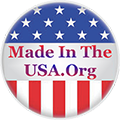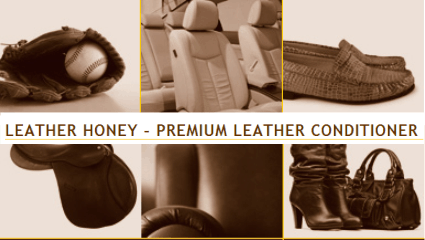One of the products Leather Honey sells is American Made Leather Conditioners. A more complete list of their products is provided by Made in America Secrets, to review their list click here.
For more information about Leather Honey and its Made in America products see the following:
Leather Honey was invented in the early 1960s, when a retired chemist met with businessman Daniel McGowen, who had recently taken over his father-in-law's Philadelphia-based manufacturing company. The two informally discussed the potential benefits of an effective sole treatment for shoes, which in those days were made entirely of leather. At that time, most commercially available leather conditioners contained solvents, which presented fire hazards and produced toxic odors. Over a period of several years, they perfected a solvent-free formula that was odorless, water-repellent, and non-toxic.
To test his formula, McGowen created a small but definitive controlled experiment. In those days, postal service workers walked many miles per day delivering mail door to door. McGowen recruited his local postman, providing him with a new pair of shoes for his rounds, one sole was treated with the formula while the other was left unchanged. To McGowen's delight, the untreated soles needed to be replaced twice before the formula-treated soles wore out?the product could make leather last at least two times as long! It didn't evaporate once absorbed into the leather, and promoted flexibility even in cold weather. In fact, the supple quality of the treated leather made it easier for cobblers to sew shoes. McGowen's workers loved it, sneaking samples home to use on other leather products?hats, gloves, jackets, boots, purses, car seats, leather furniture, and junior's baseball mitt.
The commercial potential of the concoction was obvious, and McGowen sold it as Sole Dip to several large shoe manufacturers in Philadelphia, who used it in their production of shoe soles for the military, among others. Originally, McGowen hoped to expand the product's reach, but this success was soon thwarted by another more pervasive invention of the time: synthetic shoe soles.
The product was re-born in 1972, when McGowen's son Jim discovered the formula's amazing ability to maintain the harnesses, saddles and other equipment for his farm-bred Percheron draft horses. For 25 years, with little marketing, Jim and Liz McGowen have been selling it under the name Harness Honey to tack shops and farmers, who learned that previously untreatable harness and tack could be brought back to life. Word that Harness Honey could rejuvenate any leather? from shoes and jackets to couches and car seats?spread from the farmers to the rest of the market, and hundreds of unsolicited testimonials rolled in. Given its broad applications for all leather, Jim and his son Shawn are now re-launching the same formula as Leather Honey. And the rest, as they say, is history.
Read more: http://www.leatherhoney.com/our-history/#ixzz38yugdiJR
For more information about Leather Honey and its Made in America products see the following:
Leather Honey was invented in the early 1960s, when a retired chemist met with businessman Daniel McGowen, who had recently taken over his father-in-law's Philadelphia-based manufacturing company. The two informally discussed the potential benefits of an effective sole treatment for shoes, which in those days were made entirely of leather. At that time, most commercially available leather conditioners contained solvents, which presented fire hazards and produced toxic odors. Over a period of several years, they perfected a solvent-free formula that was odorless, water-repellent, and non-toxic.
To test his formula, McGowen created a small but definitive controlled experiment. In those days, postal service workers walked many miles per day delivering mail door to door. McGowen recruited his local postman, providing him with a new pair of shoes for his rounds, one sole was treated with the formula while the other was left unchanged. To McGowen's delight, the untreated soles needed to be replaced twice before the formula-treated soles wore out?the product could make leather last at least two times as long! It didn't evaporate once absorbed into the leather, and promoted flexibility even in cold weather. In fact, the supple quality of the treated leather made it easier for cobblers to sew shoes. McGowen's workers loved it, sneaking samples home to use on other leather products?hats, gloves, jackets, boots, purses, car seats, leather furniture, and junior's baseball mitt.
The commercial potential of the concoction was obvious, and McGowen sold it as Sole Dip to several large shoe manufacturers in Philadelphia, who used it in their production of shoe soles for the military, among others. Originally, McGowen hoped to expand the product's reach, but this success was soon thwarted by another more pervasive invention of the time: synthetic shoe soles.
The product was re-born in 1972, when McGowen's son Jim discovered the formula's amazing ability to maintain the harnesses, saddles and other equipment for his farm-bred Percheron draft horses. For 25 years, with little marketing, Jim and Liz McGowen have been selling it under the name Harness Honey to tack shops and farmers, who learned that previously untreatable harness and tack could be brought back to life. Word that Harness Honey could rejuvenate any leather? from shoes and jackets to couches and car seats?spread from the farmers to the rest of the market, and hundreds of unsolicited testimonials rolled in. Given its broad applications for all leather, Jim and his son Shawn are now re-launching the same formula as Leather Honey. And the rest, as they say, is history.
Read more: http://www.leatherhoney.com/our-history/#ixzz38yugdiJR

